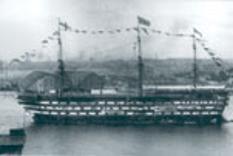The history of HMS Bulwark
Ships bearing the name Bulwark stretch back to 1777 when a 3rd Rate 74-gun vessel was ordered from Portsmouth. Although work on her began in 1780, the keel was never laid and the order was subsequently cancelled.

The second Bulwark was launched on 23 April 1807 from Portsmouth Dockyard and during almost 20 years service, saw service in the American War of 1814-15. She was finally broken up in September 1826.
The third Bulwark was a 'Screwship', laid down at Chatham Dockyard on 8 March 1859. The build was suspended and she lay dry until 1872 when she was dismantled.
The fourth Bulwark was a wooden 1st Rate 121-gun battleship.
She was launched from Pembroke Dock on 7 March 1860 but returned from her steam trials in 1861 and was never completed for sea. After serving as part of a training establishment for boys, she was 'paid off' in 1919.
The fifth Bulwark was a 15,000 ton twin screw armoured battleship, launched on 18 October 1899 from Devonport Dockyard.
In 1908, she was commanded by the most junior battleship captain at that time, Captain R F Scott, who later earned fame as the Antarctic explorer. Although active at the outbreak of the First World War, she sadly suffered an internal explosion off Sheerness on 26 November 1914 whilst embarking ammunition. There were only 12 survivors from a Ship's Company of 750.
The sixth Bulwark was laid down at Harland & Wolff, Belfast as a 22,000 ton Light Fleet Carrier and was launched on 22 June 1948.
Carrying 50 aircraft, she saw service in 1956 throughout the Suez Crisis.
She was modified in 1959 into an all-helicopter Commando Carrier, operating 16 Whirlwind helicopters. These were later replaced with Wessex helicopters. These aircraft and the four 'Landing Craft Vehicles Personnel' (LCVP) were added to aid mobility. With a complement of 1035, she could carry, accommodate and support an 800-man Royal Marine Commando unit.
Withdrawn from service in 1976 having completed her tenth commission, she was placed in reserve.
Re-commissioned in 1979 as an Anti-Submarine Warfare Carrier, she was finally listed for disposal in 1983. During her resurrection to service, Bulwark increasingly lived up to her nickname 'The Rusty B', affectionately coined from her motto 'Under Thy Wings I Will (T)rust'. She was also known as 'The Painted Lady', a reference to her numerous coats of paint!
The new HMS Bulwark is the seventh to bear the name. She and her sister ship HMS Albion were built to replace the two previously existing amphibious ships HMS Fearless and HMS Intrepid.

 Share this page on Facebook
Share this page on Facebook
 Share this page on Twitter
Share this page on Twitter
 Print this page
Print this page





